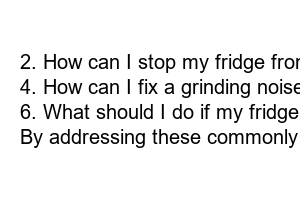냉장고 소음 원인
Title: Causes of Refrigerator Noise – Troubleshooting Your Noisy Fridge
Introduction:
Having a noisy refrigerator can be quite frustrating. Not only does it disrupt the peaceful ambiance of your home, but it can also indicate underlying issues that need to be addressed. In this blog post, we will explore the possible causes of refrigerator noise and provide potential solutions to help silence your fridge.
1. Unlevelled Fridge – The Culprit Behind the Rumble:
When your refrigerator isn’t sitting on a level surface, it can generate a rumbling noise. To fix this issue, ensure that your fridge is balanced using a spirit level, adjusting the feet or using shims to stabilize it.
2. Deteriorating Gaskets – How to Tackle the Hiss:
Worn-out gaskets, the rubber seals that line the refrigerator door, can allow air to escape, resulting in hissing or whistling noises. Replacing the gaskets helps maintain an airtight seal, eliminating the noise and also saving energy.
3. Vibrating or Loose Parts – The Remedy for Buzzing Sounds:
Loose or vibrating components, such as the condenser coils, fan blades, or waterline connections, can create an annoying buzzing sound. Tightening loose screws or fasteners and ensuring proper installation can significantly reduce or eliminate such noises.
4. Faulty Fan Motor – The Source of the Grinding Noise:
A malfunctioning fan motor can produce a grinding noise. Cleaning the fan blades and lubricating the motor can often solve this problem. However, if the noise persists, it may be necessary to replace the fan motor to prevent further damage.
5. Clogged or Faulty Compressor – The Harbinger of Clicking Sounds:
If you hear clicking or ticking sounds, your compressor may be clogged or defective. A professional technician should handle compressor-related issues, as they require specialized knowledge and tools.
6. Refrigerant Icing – The Cause of Sizzling or Popping Sounds:
When refrigerant leaks or there is an accumulation of frost, it can lead to sizzling or popping sounds as it melts or moves within the system. Regularly defrosting your refrigerator and checking for leaks are essential steps in preventing this issue.
7. Inadequate Clearance – Avoid the Unpleasant Whirring:
Insufficient space between your refrigerator and surrounding walls or cabinets can cause a whirring noise. Ensure proper clearance to allow for proper air circulation and prevent your fridge from working harder than necessary.
Summary:
In summary, a noisy refrigerator can be attributed to various factors, such as an unlevelled fridge, worn-out gaskets, loose parts, faulty fan motors, clogged compressors, refrigerant icing, or inadequate clearance. By diagnosing the cause of the noise and taking appropriate measures, such as leveling the fridge, replacing gaskets, inspecting and tightening components, and seeking professional assistance when needed, you can regain tranquility in your kitchen while ensuring the optimal operation of your refrigerator.
Frequently Asked Questions (FAQs):
1. Why is my refrigerator making a vibrating noise?
2. How can I stop my fridge from making a buzzing sound?
3. What causes a refrigerator to click?
4. How can I fix a grinding noise coming from my fridge?
5. Is it dangerous if my refrigerator is making sizzling or popping sounds?
6. What should I do if my fridge is excessively noisy despite troubleshooting?
By addressing these commonly asked questions, we hope to provide further clarity and assistance regarding refrigerator noise troubleshooting and solutions.

